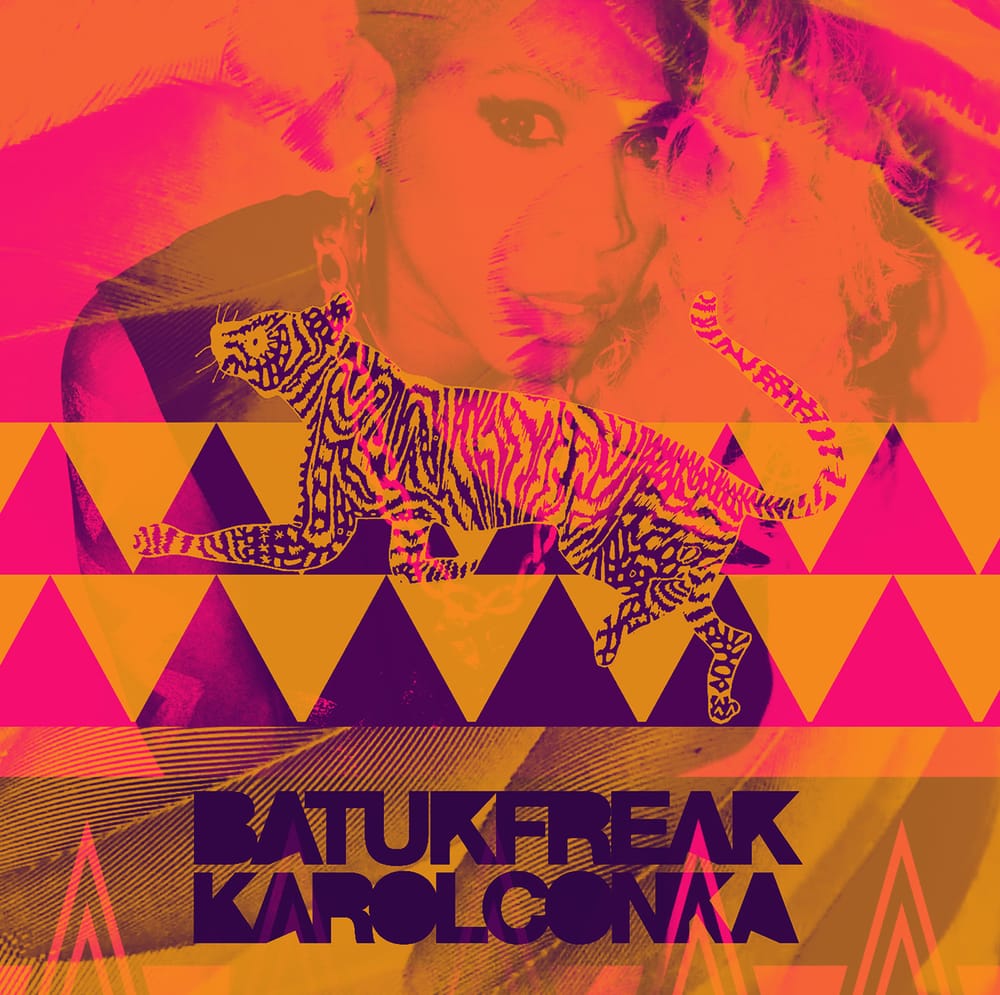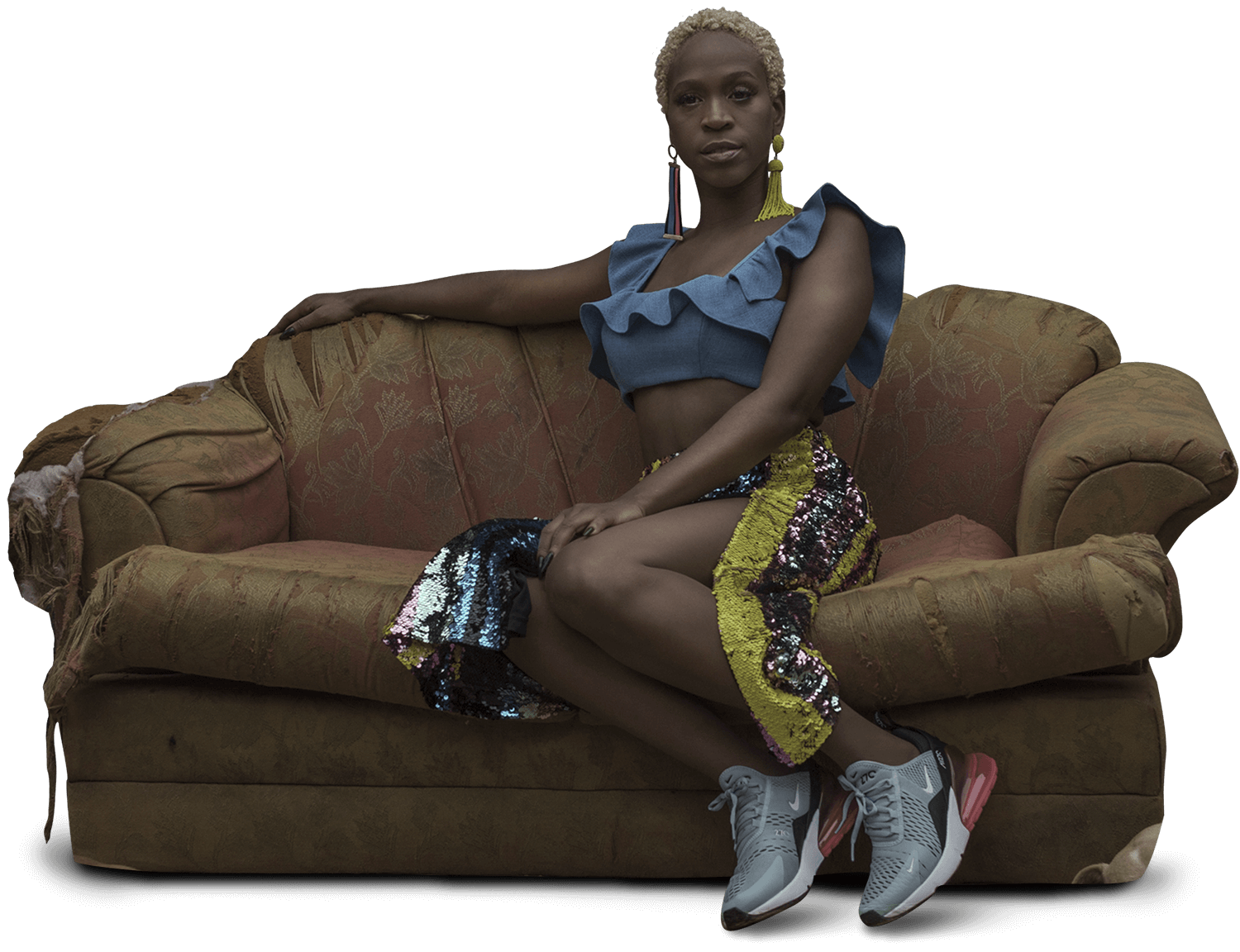
Karol Conka is nothing short of a phenomenon. A young Curitiba-born woman, which is not exactly one of Brazil’s megalopolises where hip-hop originates from. Yet, her talent, energy and freedom of expression have turned her into a nationally renowned exception.
Curitiba is far from an acknowledged bastion of hip-hop, unlike its southern neighbouring cities – São Paulo and Rio de Janeiro – Nicknamed the cidade de vidro (“the city of glass”) because of its modern architecture, Curitiba is famous for its high education rate and sustainable development policy. It’s in this environment that Conka, the super-heated and hyped-up rapper, TV host and model, grew up. Her second album Ambulante was released this year on Universal Music Brasil. Karoline dos Santos Oliveira chose “Conka” as her alias, which translates to “Carol with a K” in Portuguese (“com ka”). The 31-year-old artist is the youngest in our profile spotlight. Conka grew up with a modest family in Curitiba, located in the state of Paraná. Her everyday life was very much different to the violent favelas of Rio described by Marcelo D2 or São Paulo’s harsh urbanism found in Emicida’s and Criolo’s music videos. Unlike her male counterparts, Conka does not convey social messages through rap: “I am interested in political hip hop, but what I’m doing is the opposite”, she explained when we interviewed her before her Paris show at Petit Bain. This was 2014, when Parisians first discovered Conka, whilst petite in her physical presence, held an inexhaustible energy “ao vivo” (“on stage”). “I’m fighting against against low self-esteem and pessimism”, she continues, “and I want to bring joy and happiness through my lyrics”.
The batucada enthusiast
At 13, she took contemporary dance lessons, but four years later became a rapper: “I took the microphone during parties in Curitiba. At that time, I was influenced by Erykah Badu, Lauryn Hill, and Missy Elliott.” She started with two mixtapes she released via the local collective Upground, overseen by Cadelis MC. Her first promo EP was released in 2011 and did not gain much traction outside of the underground scene. In 2012, during a show at Curitiba’s Master Hall, São Paulo-based rapper Projota offered her a feature on his track “Não Falem”. This was a defining point in her career, as she met beatmaker Nave: this chance meeting resulted in Conka’s debut album Batuk Freak one year later. “I asked him to dig deep to find Brazilian-influenced beats that would compliment my personality. I gave feedback on the samples he suggested we use, and I’m very happy with the final result.”
And likewise so are we! Batuk Freak is a true baile funk jewel with atabaque percussions reminiscent of capoeira and batucada genres, hence the title, Batuk: “This atmosphere is important to me because I want to show I’m Brazilian, and that Brazil has great music and rhythms. My beatmaker is the ‘batuk’, and I am the ‘freak’ because I’m a little crazy sometimes. Nave once told me: ‘You’re crazy. We should call this Batuk Freak. And that sounded right to me.” It’s no wonder that the “crazy” Conka lays claim to the influence of Island-born singer Björk, another unconventional and free-spirited woman she likes talking about: “she’s eclectic when it comes to her music. I admire her originality and she has an overflowing imagination. Her mindset also appears somewhat disturbed and I like that!”

Mr. Bongo’s museo
In terms of aesthetics, Conka stands out a mile with her short hair dyed blonde that features on the fluorescent pink cover of Batuk Freak LP. The French music magazine Les Inrocks nicknamed her the “Brazilian M.I.A.”, referencing the famous Sri-Lanka-born female rapper. The video clip also caught the eye of UK label Mr Bongo’s boss David Buttle: “He was looking for new Brazilian hip hop talent”, recalls Conka. “He watched my video clip for ‘Boa Noite’ on YouTube and loved it. He then contacted me on Facebook. When the record was ready, he released it to Europe.” For a track with an amphetamine-like hit, “Boa Noite” (“Good Night”) is on the contrary not an invitation to sleep, but an anthem for the insomniacs! It borrows from classic hip hop themes with a video that features young people dancing with a ghetto blaster on a checkered carpet: “I wanted to show Brazil’s racial diversity with this video we shot in a club in Curitiba. You can see White, Black and Japanese people all dancing and enjoying themselves together. The song starts with me stating that I’m here to stay. The idea is that I want to share my music with the whole world.”
This song was also used to represent the Brazilian soccer team in the Fifa 2014 video game: “I’m very proud of this because it’s not easy to have the recognition to represent our colors.” On the subject of futebol – a true passion for every Brazilian – you can see Conka wear the national team’s jersey in São Paulo-based rapper Rincon Sapiência’s video “Resenha de Futebol” which translates as “soccer exam”.

100 % feminista
Is it hard for a woman to assert herself in a macho rap scene? Conka managed to somehow make herself comfortably at home within the scene without ever sacrificing her beliefs: “It wasn’t hard for me to establish myself; I saw it as a challenge. I didn’t really take inspiration from local female rappers, because Brazilian female MCs tend to dress like men. Their voices are masculine. That’s not me.” At the same time, Conka is completely open about her bisexuality, advocating tolerance and supporting the feminist movement. In 2016, MC Carol, a 24-year-old Brazilian female rapper from Niterói, Rio de Janeiro, invited her to collaborate on the explicitly titled “100% Feminista”, featured on the album Bandidada (a live version is featured at the end of this video, shot in Florianapolis).
Brazilian TV viewers were also treated to seeing Conka presenting the show Superbonita which aired on GNT last year. Conka’s next LP, Ambulante, shows yet another transformation in terms of look. Her hair is tinged pink à la Nicki Minaj, with ribbons on her clothes and bluntly addressing sex in the very “floral” song “Lala”, produced by the São Paulo-based electronic music duo Tropkillaz. She claims her Afro-Brazilian heritage in an excellent cover of “Cabeça de Nego” (literally translating to “Nigger’s face”), featuring the vocals of the late Sabotage, assassinated in 2003. The video was shot in Boqueirão, a favela located in the notorious Zona Sul of São Paulo. As you can by now tell: the hybrid universe of Karol Conka has not ceased to amaze us. Com prazer! (“With pleasure!”)
Follow Karol Conka : Facebook / Instagram / Twitter / Website



